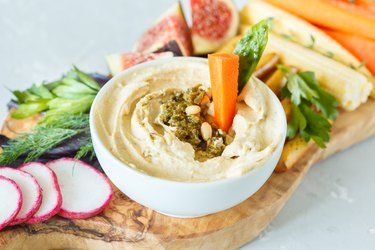
While snacks tend to be lighter than full-on meals, they can still have a significant effect on our health — for better or for worse. Choosing healthy snacks is an easy way to fit in vital nutrients our bodies need, but some noshes can leave us feeling bloated.
If you've found yourself gassy and uncomfortable throughout the day, the snacks you pick on may very well be the culprit. Below, find five seemingly harmless snack foods that cause bloating.
Video of the Day
Video of the Day
The good news is there are many healthy alternatives you can choose to stay bloat-free.
1. Sweetened Yogurt
Nutritionally-speaking, yogurt makes for a great snack. It's packed with protein, calcium and gut-friendly probiotics. But, you'll want to avoid yogurt sweetened with artificial sweeteners or sugar alcohols, especially if you're feeling the bloat.
Some alternative sweeteners like stevia, saccharin and sucralose may cause an imbalance in our gut bacteria (although more research is needed to confirm this), per a January 2019 study published in Advances in Nutrition.
And sugar alcohols, like sorbitol and maltitol, aren't digested by our bodies, so when they make their way down to our large intestine, they're then processed by our gut bacteria. This process releases gas, causing you to feel bloated.
Try This Instead
Your best bet is to skip yogurts sweetened with sugar alternatives and opt for plain yogurt instead. For added sweetness, top your yogurt with fruit, or choose yogurts that contain minimal amounts of (real) sugar.
2. Energy Bars
Energy or protein bars are portable and convenient, making them a popular snack. While there are hundreds of different bars out there, many of them contain bloat-triggering ingredients that can leave you feeling less than stellar.
Isolated fibers, like chicory root, are one such ingredient often added to bars that cause GI distress. Isolated fibers are added to boost the bar's fiber content, but for some people, eating a large amount of fiber can be hard on the system, leading to gas and bloating, per the Mayo Clinic.
Sugar alcohols are often added to bars as well because they help to keep the amount of added sugar to a minimum, which is attractive to many consumers. As we know, our bodies aren't equipped to process sugar alcohols on their own — we rely on the bacteria in our guts to do it for us, and they ferment the sugar alcohols, releasing gas and leaving us feeling bloated and gassy.
Try This Instead
Enjoy a piece of fruit or a handful of nuts instead of a bar. If you are buying bars, look for one that is free of added fibers and artificial sugars or sugar alcohols if bloat is your concern.
3. Carbonated Beverages
Considering an afternoon soda for a little pick-me-up? You'll want to think twice. Soda and any carbonated beverage like seltzer are, well, carbonated, which means they contain the gas carbon dioxide.
When you sip on these beverages, carbon dioxide enters your GI tract and can leave you feeling bloated. Worse yet, if you're sipping with a straw, you're drawing air into your gut, which just compounds the issue.
Try This Instead
Sip on plain water or flavor it by adding a slice of lime or infusing it with other fruits and herbs. Skip the straw altogether and drink straight from the glass.
4. Veggies and Hummus
Veggies dipped in hummus is a healthy snack, but it can lead to stomach troubles for some.
Hummus is made from chickpeas, which is a legume rich in fiber, iron, phosphorus, magnesium, zinc and potassium, according to the USDA. They also contain a starch called raffinose, which our bodies are not able to break down. These fibers eventually make their way to our colon where the bacteria in our gut break them down for food through fermentation, releasing gas.
This bloat factor may be amplified if you are pairing hummus with raw vegetables like broccoli and cauliflower, which also contain raffinose.
It's worth noting that while this fermentation of fibers may cause bloating, the process also creates beneficial short-chain fatty acids called butyrate, which reduces inflammation and strengthens our gut walls, as outlined in a November 2016 study in Food Science and Human Technology. In other words, the good may outweigh the bad.
Try This Instead
Use another dip like guacamole or an almond- or tahini-based dip. Opt for vegetables low in raffinose, including cucumbers, carrots and celery.
5. High-FODMAP Fruits
FODMAP stands for fermentable oligosaccharides, disaccharides, monosaccharides and polyols, which are specific types of carbohydrates.
Some groups of people, particularly those with irritable bowel syndrome (IBS), may be sensitive to fructose and sorbitol, two FODMAP compounds naturally found in fruit. Fructose is a natural sugar and sorbitol is a naturally occurring sugar alcohol, both of which our bodies don't digest well.
Fruits high in fructose:
- Apples
- Pears
- Mangoes,
- Cherries
- Watermelon
Fruits high in sorbitol:
- Apples
- Pears
- Cherries
- Peaches
- Plums
Try This Instead
If you're sensitive to fructose or sorbitol, you certainly don't need to avoid fruit altogether. There are plenty of delicious fruits lower in FODMAPs, including grapes, strawberries, kiwi, oranges and pineapple.
- Advances in Nutrition: "Effects of Sweeteners on the Gut Microbiota: A Review of Experimental Studies and Clinical Trials"
- Mayo Clinic: "Dietary Fiber: Essential for a Healthy Diet"
- MyFoodData: "Chickpeas (Garbanzo Beans) (Cooked)"
- United States Department of Agriculture: "Bioactive Constituents in Pulses and Their Health Benefits"
- Monash University: "How to Include Plenty of Fruit on a Low-FODMAP Diet"